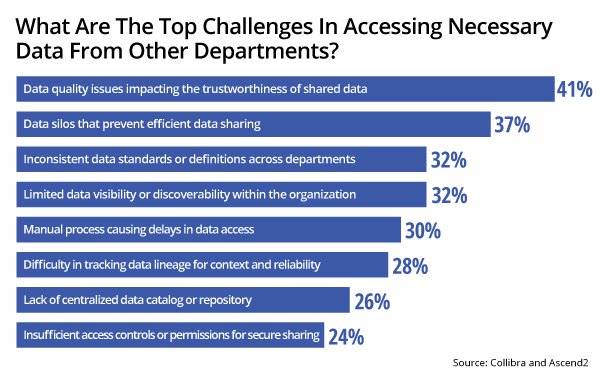
Data challenges affect every department in a company, particularly the email team. And the biggest issues concern access to data from
other units, judging by The State Of Data Confidence, a study from Collibra, conducted by Ascend2.
Of the professionals surveyed, 90% say they would benefit from improved data sharing, moderately or significantly. But only 21% list reducing information silos as a
top priority.
As it is, there are several hurdles to accessing data from other
departments:
- Data-quality issues impacting the trustworthiness of shared data — 44%
- Data silos that prevent efficient data sharing
across teams — 37%
- Inconsistent data standards or definitions across departments — 32%
- Limited data visibility
or discoverability within the organization — 32%
- Manual processes causing delays in data access —
30%
- Difficulty in tracking data lineage for context and reliability — 28%
- Lack
of centralized data catalog or repository — 26%
- Insufficient access controls to permissions for secure sharing — 24%
advertisement
advertisement
How adept are companies managing these ai tasks? They rate themselves as having:
- High confidence — 45%
- Moderate confidence — 42%
- Low confidence — 11%
High-confidence organizations tend to:
- Monitor data consistency —
59%
- Access timeliness of data — 44%
- Validate data formats —
52%
- Maintain high visibility into data pipelines — 64%
Overall, 55% of high-confidence firms feel their data is highly consistent. In contrast, firms in
the less confident groups act as follows, with the following actions:
- Monitor data consistency — 47%
- Access timeliness of data — 24%
- Validate data formats — 42%
- Maintain high visibility into data pipelines — 20%
High-confidence firms also follow these data governance practices:
- We have
well-established data governance roles — 61%
- We have fully standardized data policies and terminology across the organization — 59%
- Regular
audits are conducted to monitor data governance practices — 57%
- Our data governance roles align closely with overall organizational goals — 55%
- We have defined KPIs that track data governance performance — 53%
- We have fully standardized definitions — 52%
On another front, brands
are attempting to cope with artificial intelligence. The top challenges when building or deploying AI models are:
- Reliability of data — 53%
- Ensuring compliance with growing regulations — 45%
- Assessing potential risks — 41%
- Balancing pressure to ship new AI models
quickly with the need to minimize risk — 41%
- Traceability/explainability of data — 39%
- Ensuring alignment across
cross-functional stakeholders — 36%